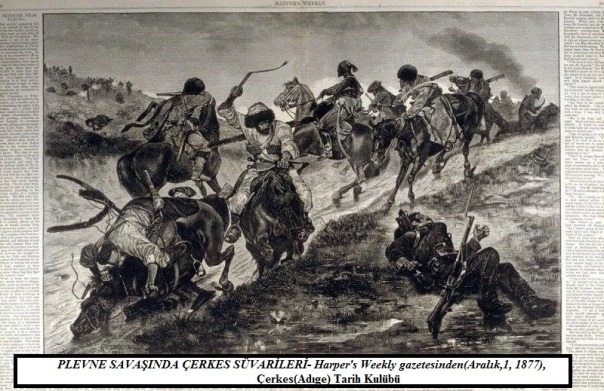had one more adventure before his safe return. He and his
Russian escorts encountered pro-Ottoman Circassian
cavalry. As can be seen from the article below, some
Circassians were also fighting on the Russian side.//
NY Times article 1877 click here for a report about
Circassian cavalry in the Russian army balking at
firing on the Turks, their fellow Moslems.

Circassian cavalry fighting on the Ottoman side at the
Battle of Plevna.
My chat with the Russian colonel was continuing quite nicely and as we
approached our army's camp my joy increased. But all of a sudden the
Russian captain on my left excitedly shouted "Circassians! Circassians!"
He pointed to the right to indicate a number of horsemen coming toward
us. When we looked with binoculars we could see 10-15 Circassian
cavalrymen heading in our direction.
The Russians' faces turned pale and mine must have been the same
color. Our fear was based on the same truth: the Circassians wouldn't
know anything about the meaning of an envoy and a white flag.
Certainly, they had never encountered such things before. So what
would happen? Thinking we were the enemy, they would pounce on
us and do whatever they wanted to. Consequently, there was no time
to lose.
I said to the two Russian officers "I'll go meet them and you follow me
slowly." I rode off toward the Circassians and the way seemed to be
flat, although I couldn't see the ground because the local people had not
cleared the field of grass and corn in wartime. So here and there, wide
and narrow trenches , some of which were filled with water, were
encountered. Nevertheless, my horse Demir cleared the trenches like a
gazelle.

In 5-10 minutes I neared the Circassians, shouting in Turkish and
pointing to my 'fez' (Ottoman hat). We met and I began to explain the
situation, with some difficulty because they were looking at what they
thought were four enemy horses, guns and other items. Ultimately, I
got them to listen and signaled to the Russians to come to us. But the
Russians' horses weren't like Demir and the captain's horse tripped
and dunked him into the mud. Seeing this, the Circassians got a good
laugh, although they were disappointed about missing out the loot they
otherwise would have taken.
The Russian officers finally reached us - the captain was quite
embarrassed about the coat of mud he wore. We continued on our way
but the Circassians followed and I kept my eye on them. Then we
came to our forward outpost and I bid good-bye to the Russian officers. I was concerned,
though, that the Circassians would pursue the departing Russians. If
something untoward were to happen it would be a stain on the honor of
the entire Ottoman army.
So I asked the outpost commander to block the Circassians and watch
the Russians with binoculars until they reached their army's camp,
keeping the Circassians in check until that time. After we waited quite
a while, I headed off toward Hezargrad (Razgrad), where in the
aftermath of the battle my commander had set up his new HQS.

Razgrad (Hezargrad)
Near morning, I reached the camp and first encountered Hacı, who told
me that for a time he had been caught between our side and the Russians
during the battle. He had hid himself until our soldiers made their
bayonet charge, identified himself, found a horse and made his way
back to our camp, with some difficulty.
My commander Mehmed Ali Paşa came out of his tent and first said
he was dismayed to learn that we had gotten stuck at the Russian
forward outpost and couldn't return before the battle started. He said
that he assumed we had moved toward the Russian HQS and initiated
the battle, as he had said he would.
The young Sultan Abdülhamid II.
In any event, he conveyed my report about my mission to Istanbul by
telegraph and within an hour an order came from Istanbul for me to
come and make my report there right away. Without a moment's rest,
I boarded the train for Varna and sailed from there to Istanbul, where
I reported in detail to the Sultan (Abdülhamit II) for two hours about
my mission to the Russian HQS. I had just a couple of hours to see
my family before catching the evening boat back to Varna. 48 hours
later I was at our HQS in Hezargrad.
telegraph and within an hour an order came from Istanbul for me to
come and make my report there right away. Without a moment's rest,
I boarded the train for Varna and sailed from there to Istanbul, where
I reported in detail to the Sultan (Abdülhamit II) for two hours about
my mission to the Russian HQS. I had just a couple of hours to see
my family before catching the evening boat back to Varna. 48 hours
later I was at our HQS in Hezargrad.
In 9 days I had covered 1100 kilometeres, more than 300 of them
blindfolded.
blindfolded.
İzzet Fuad
//END of PART XI/FINAL//
//END of PART XI/FINAL//

Hiç yorum yok:
Yorum Gönder